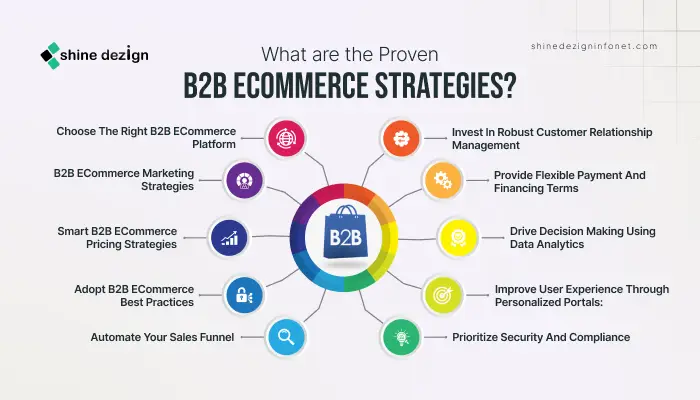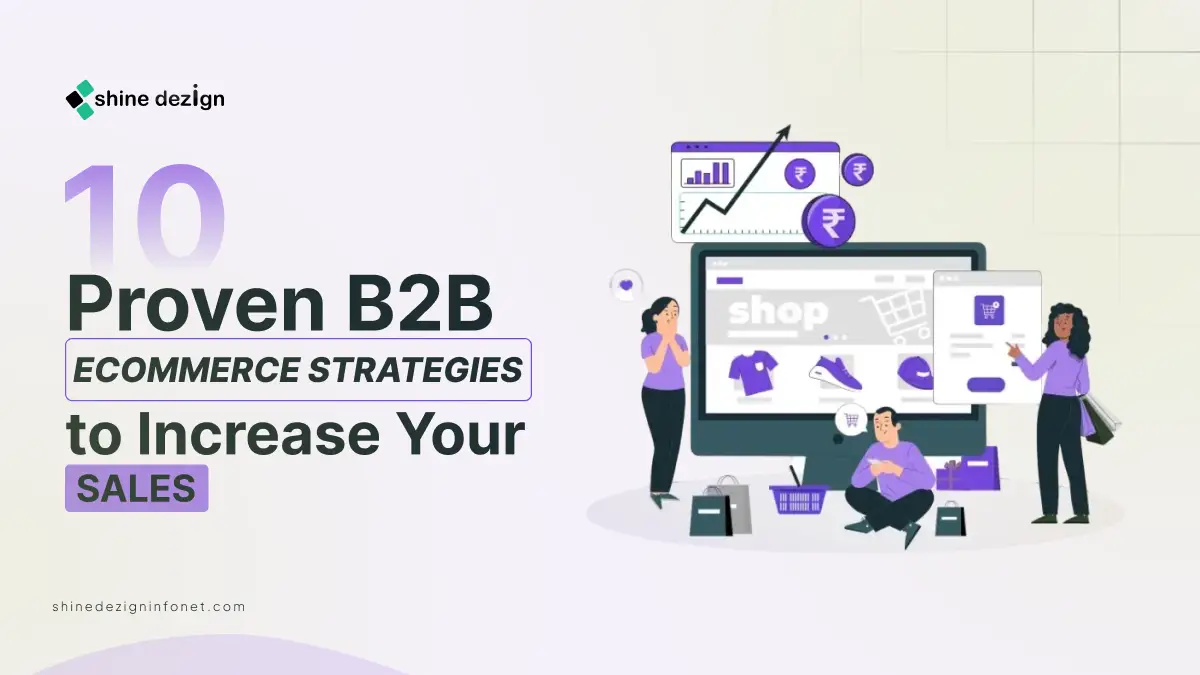Table of Contents
Having a solid b2b ecommerce strategy in place is crucial for businesses that must stretch their sales and stay competitive. The right b2b ecommerce solution paired with the correct b2b ecommerce platform can change how you do business with your customers and ensure your sales are seamless.
This guide is designed to acquaint you with the underlying ideas, differences, and habits that result in effective b2b ecommerce. Throughout this article, you will encounter actual insights and useful tips to increase your business.
What is Business-to-Business (B2B)?
 Business-to-business (B2B) refers to the selling and purchasing of goods or services between companies and not between a company and final individual customers. Compared to B2C (Business-to-Consumer), B2B buying often involves higher order quantities, longer sales cycles, and customized products.
Business-to-business (B2B) refers to the selling and purchasing of goods or services between companies and not between a company and final individual customers. Compared to B2C (Business-to-Consumer), B2B buying often involves higher order quantities, longer sales cycles, and customized products.
In ecommerce, b2b ecommerce websites enable such transactions to be conducted online efficiently, providing facilities and tools as per the specific business buyers’ requirements.
How B2B is Different from B2C: B2B vs B2C eCommerce?
It is essential to have knowledge of the difference between b2b vs b2c ecommerce while strategizing. B2C ecommerce tends to be inclined towards high volumes of low-value transactions with customers, while B2B ecommerce facilitates lower, high-value bulk orders between businesses.
B2B vs B2C eCommerce Comparison
| Factors/Aspect | B2B eCommerce | B2C eCommerce |
|---|---|---|
| Customer Type | Businesses and organizations | Individual consumers |
| Transaction Volume | Fewer, high-value bulk orders | Many lower-value purchases |
| Pricing | Negotiable, volume, and contract-based | Fixed prices, discounts/promotions |
| Sales Cycle | Longer and more complex decision process | Shorter, impulse-driven purchases |
| Customization | Tailored solutions and personalized catalogs | Standardized products for the mass market |
| Customer Support | Dedicated account managers and support teams | General customer service |
Why B2B eCommerce is Important?
The impact of digital transformation made online sales channels crucial for B2B companies. Application of b2b ecommerce websites and good b2b ecommerce solutions provides numerous significant advantages:
Increased Reach
Reach customers beyond geographical limitations. With b2b ecommerce platforms, business organizations can reach partners and buyers internationally, opening up new markets and opportunities that other channels cannot identify. Such a reach helps companies expand more rapidly and extend their customer base.
Lowered Costs
Automate sales functions to decrease labor and error expenses. With digital sales channels, paper-intensive and manual administrative tasks are reduced, leading to time savings and decreased operational costs. Automation also enhances order accuracy and ensures that pricing and inventory information are always up to date.
Improved Customer Experience
Provide customized catalogs, prices, and easy reordering. Modern b2b ecommerce platforms enable customized support that caters to the specific needs of each business customer, making it easier to find the correct products and order them efficiently. Easy reordering results in more loyal and satisfied customers.
Data Insights
Track sales trends and customer behavior to optimize pricing and marketing. In-depth analytics access gives businesses insight into customers’ buying patterns, demand forecasting, and high-value customer identification. This data empowers smarter decisions and allows marketers to launch effective, targeted marketing campaigns that generate maximum ROI.
Competitive Advantage
Start ahead in a rapidly moving digital market. Adopting a strategic b2b ecommerce approach and utilizing newer platforms puts your business ahead of the challenges of today’s and tomorrow’s marketplace. Business organizations that work with digital transformation are well-positioned to innovate and respond quickly to shifting customer needs.
Adequate use of a b2b eCommerce strategy ensures companies transform and thrive in the dynamic marketplace.
What are the Proven B2B eCommerce Strategies?

Below are strategies that can be employed to increase sales in B2B eCommerce:
1. Choose the Right B2B eCommerce Platform:
Your choice of a b2b eCommerce platform matters. Look for platforms that have customizable catalogs, tiered pricing levels, and easy integrations to your in-house systems. Make sure the platform is scalable in a way that your business expands without having to switch systems
2. B2B eCommerce Marketing Strategies:
Business buyers require specialized marketing. Use specialized content, inbound marketing, and SEO methods with attention to your industry’s nuances. Utilize LinkedIn and email marketing to reach decision-makers efficiently with targeted messages.
3. Smart B2B eCommerce Pricing Strategies:
B2b eCommerce price strategies play a critical role in winning and retaining customers. Offer volume discounts, price tiering, and value-based flexible contract pricing. Automate pricing wherever feasible to ensure consistency and reduce errors.
4. Adopt B2B eCommerce Best Practices:
Adopt b2b ecommerce best practices such as delivering accurate product specs, transparent shipping and return policies, and prompt customer support. Ensure that your platform is mobile-friendly to be able to serve the growing population of mobile consumers.
5. Automate Your Sales Funnel:
Implement automation tools to handle recurring tasks like order processing, invoicing, and follow-ups. This reduces inefficiency and minimizes human error within the sales funnel. Automation further enables customized communications at scale, enabling better client interaction.
6. Invest in Robust Customer Relationship Management (CRM):
Integration: Sync your b2b eCommerce site with CRM applications to provide real-time customer behavior insights to sales teams. The integration helps in customizing your sales strategies and building customer loyalty.
7. Provide Flexible Payment and Financing Terms:
Accommodate payment methods like credit terms, purchase orders, and financing terms to cater to varied customer needs. Flexible terms increase customer satisfaction and can accelerate the sales process.
8. Drive Decision Making Using Data Analytics:
Utilize business intelligence software to monitor sales patterns, customer buying habits, and pricing performance. Data-driven decision-making assists in making before-the-fact adjustments to marketing and pricing for improved results.
9. Improve User Experience through Personalized Portals:
Develop customer-specific portals delivering customized catalogs, prices, and order history. Personalization makes re-ordering easy and helps build stronger relationships with your business customers.
10. Prioritize Security and Compliance:
Ensure your b2b eCommerce website adheres to industry norms in security to keep sensitive business data safe. Security built through stringent security measures can cause your company to be different from the rest of the market.
Summing Up
Using an effectively developed b2b ecommerce strategy that employs suitable b2b ecommerce platforms and b2b ecommerce solutions is essential to thrive in the competitive commercial climate of today’s era.
By focusing on personalized marketing, pricing, and operational excellence, your business can improve revenue, improve customer relationships, and remain competitive. Be flexible, listen to what your customers individually need to succeed, and continually refine your process for ongoing success.

















